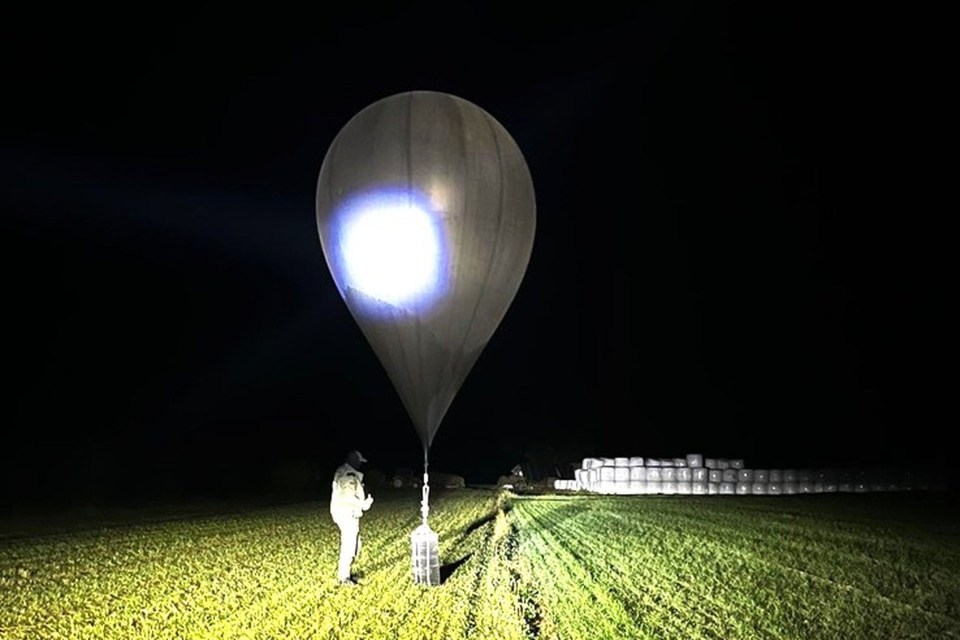BALLOONS stuffed with thousands of cigarettes have flown across an airport and shut it after being launched by a pal of Vladimir Putin.
Vilnius Airport in Lithuania was shut down on Sunday night when 25 meteorological balloons were detected entering the country by the National Crisis Management Centre.
AP25 balloons carrying counterfeit cigarettes were detected[/caption]
State Border Guard ServiceTwo of the balloons were seen flying over the Lithuanian airport[/caption]
APThe cigarettes flew in from neighbouring Belarus, ruled by President Alexander Lukashenko[/caption]
Two of the balloons – entering from neighbouring nation Belarus – ended up flying directly over the airport.
The origin of the balloons has sparked suspicion of Russian involvement, as Belarusian President Alexander Lukashenko is a close ally of Vladimir Putin.
Lukashenko has ruled Belarus with an iron hand for more than 30 years – and has relied on Russian subsidies and support – allowed Russia to use his country’s territory to send troops into Ukraine in February 2022.
The helium-filled balloons were ferrying thousands of counterfeit packs of cigarettes.
A spokesperson from the Vilnius Airport said the shut down led to 30 flight cancellations putting a pause to 6000 passengers’ travel plans.
The spokesperson warned there could still be delays into Monday.
The airspace violations have come as tensions in Europe continue to rise after numerous drone incursions with suspected Russian links.
Major air traffic disruptions have occurred across the continent, with Moscow denying involvement in the recent incidents.
On Friday, Munich Airport was shut down after drones were spotted just days after a bomb threat.
The German airport was plunged into chaos after mystery drones forced both runways to close.
Thousands of passengers were left stranded as the city prepared for the final week of Oktoberfest.
German police on Thursday confirmed “several drones” were spotted hovering near the travel hub from around 9.30pm, with sightings later over the airfield itself.
Officers scrambled to track the devices but were unable to identify them or their operators, Bild reported.
By 10.30pm flights had been halted and the airport shut down, with 17 departures cancelled.
Fifteen incoming flights had to be diverted to Stuttgart, Nuremberg, Vienna and Frankfurt.
And around 3,000 passengers were left sleeping on camp beds with snacks and drinks handed out overnight, according to airport officials.
The alerts came just days after French troops swarmed a Russian ship, believed to be the source of other Nato airspace drone disturbances.
The ghost oil tanker was one of the three ships linked to Russia’s mysterious “shadow fleet” – and is being probed after Europe’s drone menace.
State Border Guard ServiceThe balloons are the latest of many disturbances in European airspace[/caption]
State Border Guard ServiceA similar incident happened in 2024 when 1200 packs of illegal cigarettes were intercepted in another balloon[/caption]
French soldiers boarded the ship PUSHPA, which was seized off the coast of Saint-Nazaire, Le Parisien reported.
It raised eyebrows after it was spotted sailing close to the Danish coast on the night of the drone attack, which forced Copenhagen airport to shut.
Also called Boracay, the Benin-flagged vessel blacklisted by the European Union, was stationed off Denmark from September 22 to 25, according to ship tracking data.
According to the specialist website The Maritime Executive, the 801-foot vessel is suspected of being involved in mystery drone flights that disrupted air traffic in Denmark in September.
Denmark, Norway and France are among the Nato countries where rogue drones have been spotted.
German Interior Minister Alexander Dobrindt said the threat from drones was “high” and that the country would take measures to defend itself.
“There is a threat that can be classified as high when it comes to drones. It is an abstract threat, but very concrete in individual cases,” Dobrindt told journalists in Berlin.
Among the measures, Germany will look to revise an aviation security law to allow the nation’s armed forces to get involved to possibly shoot down drones, he said.
“It’s about being prepared so that critical infrastructure or large gatherings of people, for example, can be protected,” the minister added.
Officials in Europe have since been on high alert after drone incursions have shut down multiple airports in the last month.

